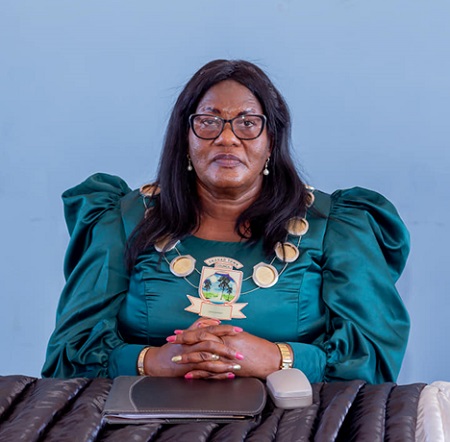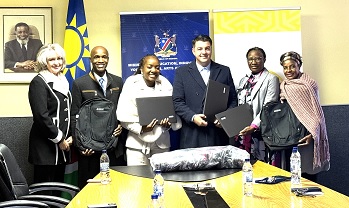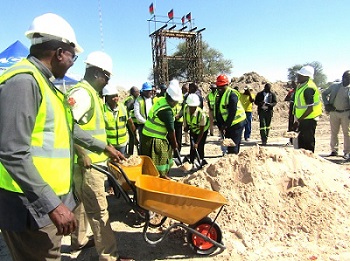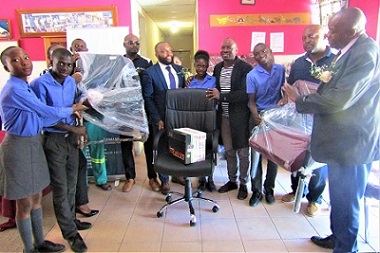By Shivute Kaapanda /
In the north-western part of Namibia lies the small town of Okahao.
Proclaimed as a town in 2005, Okahao is located in Omusati Region, lying some 75km west of Oshakati and 55km south of Outapi.
With an estimated population of 7000 residents, Okahao is one of the fast growing towns in northern Namibia.
Despite the town’s famous tag of being the home town of Founding President and Father of the Nation Dr. Sam Nujoma, Okahao had for years after Independence been just a cluster along the road of shops, bars, two service stations, a secondary school, hospital, traditional authority’s office, and the Lutheran Parish – and a few houses here and there.
Just a decade ago Okahao did not have a single informal settlement.
After the proclamation of the town came such developmental structures as shopping complexes, banks, housing units – and also informal settlements, that is, housing structures made out of corrugated iron zincs for those who are at the lowest end of the economic pyramid.
With the rural-urban migration of people in search of waged labour and those looking for income through hawking and other informal trading, the number of informal settlement dwellers is now seen to be growing rapidly.
But, still, Okahao has only two informal settlements, which are far less populated; they are Omakee and Okashenda informal settlements.
Forty-seven-year-old Meme Rauna Shatipamba originally from Onashitendo village in Tsandi Constituency is a resident of Okashenda informal settlement. She has been a resident since Okashenda was established some years ago.
“We do not have water and electricity here at our shack, no sanitation; we relieve ourselves in the nearby bush,” she tells Omutumwa.
Although she had moved to Okashenda to be in town where opportunities for a better living seemed to be, Shatipamba narrates a tale which indicates the opposite.
She lives in a two-bedroom shack with her nephew who works as a casual builder in town. “Sometimes he doesn’t have work, so we sit at home together with not enough food,” she says.
She also tells Omutumwa that sometimes she goes to sell second-hand clothing (bales from Angola) at Oshipwatapwata open market in town to make a living but the market for second-hand clothing has become saturated and the business has gone down on her side.
Despite the fact that many people in her situation do receive some kind of food aid from the state, she says that she never got drought relief food since she settled at Okashenda location.
“We rely on pounded mahangu meal which we get from our village house where I have a field and during the rainy season I have to go cultivate often or send money for ploughing and cultivation,” she states.
The household has never applied for electricity from the town council knowing that they cannot afford it, she says, and they fetch water from their neighbour’s house for a fee every day since he has municipal water available.
“Life is depressing here in the location. I want a job, even cleaning in government offices I will appreciate it.”
Another resident of Okashenda informal settlement, Shoopala Namukwambi, a 36 years old resident also narrates how life has not been pleasant over the past three years of living in one of the two informal settlements of Okahao.
For three years he has lived with no electricity or clean municipal water at his shack. Although he works at one of the food retail shops in town, where he started as a casual but now permanently employed, his earnings cannot sustain him since urban life is expensive and highly demanding.
“I cannot afford to have electricity at my shack or pay for water bills, so I fetch water at the neighbour’s house for a fee,” Namukwambi says.
Originally from Iipanda in Okahao Constituency, Namukwambi feels the wrath of urban life and is experiencing a sense of hopelessness as a young person living in the dusty streets of Okahao at Okashenda informal settlement.
“I studied for a Bachelor of library sciences at UNAM but I cannot find a job related to my qualification since I graduated in 2018. I am now left to hustle for any job opportunity out there to sustain myself and my kids who are with my grandmother at the village.
“Life is painfully hard. But I want to save money to study nursing in the coming years.”
When contacted for comment Mr. Simon Shinguto, acting Chief Executive Officer of Okahao Town Council, speaking on behalf of the town’s Mayor and management, says that the council is working hard in partnership with its residents to arrest the housing, water and sanitation situation being experienced by those in Okahao’s informal settlements.
“The council is aware about the situation in the informal settlements, and despite financial constrains the council is working hard to bring the best services to its residents including water, housing and sanitation services to the informal settlements,” Shinguto states.
“The council is as well dedicated to empowering young entrepreneurs in business.”
He also highlights that the Okahao Town Council has constructed a technical business centre that currently accommodates small and medium enterprises involved in welding, carpentry, auto mechanics and other technical industries.
He further tells Omutumwa that the construction of Phase 2 of the Technical Business Centre is nearing completion and this phase will feature kiosks or closed stalls and it will accommodate more small and medium enterprises (SMEs).
“This will help create employment in Okahao town especially for the skilled artisans and it will boost the economy of the town.”
Also giving the council’s perspective on the state of informal settlements of Okahao is Councillor Johannes Aluvilu, an ordinary member of the council. He highlights that despite the low number of informal settlements and residents in Okahao the council has put housing as a priority and has played a vital role in providing low-cost housing to its residents.
“We at Okahao town council are working together to serve the residents’ needs and as a capable leadership with our Hon. Mayor Cornelia Iiyambula Okahao will be a ghetto-free town in the near future,” he stresses.
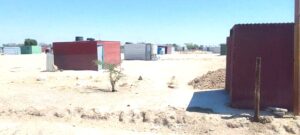
In the photo: Her Worship the Mayor of Okahao Town Council, Cornelia Iiyambula. In another image is some of the corrugated iron sheet shacks at Okashenda informal settlement of Okahao town.

[NB. This article was produced with the financial support of the European Union. Its contents are the sole responsibility of Omutumwa and do not necessarily reflect the views of the European Union.]

